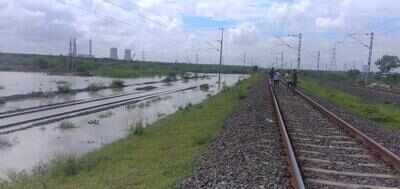- News
- City News
- nagpur News
- Koradi Thermal Power Station plant’s ash bund falls, toxic slurry in farms and houses
Koradi Thermal Power Station plant’s ash bund falls, toxic slurry in farms and houses

The toxic slurry submerged Kalamna-Godhni railway track
NAGPUR: In an accident that villagers claimed has not happened for the first time, the Khasala fly ash bund of Koradi Thermal Power Station breached on Saturday, flooding three villages with toxic fly-ash slurry. From farmlands to houses to natural nullahs and even Kanhan, which provides drinking water to Nagpur city, and Kolar rivers, the slurry reached everywhere thus leading to massive damage and contamination.
 According to residents of affected villages, the embankment wall of the bund collapsed around noon, immediately after which fly-ash slurry started heavily flowing out, submerging nearby villages. The most affected ones were Kawtha, Khairi and Mhasala. Koradi Thermal Power Plant is located in the outskirts of the city.
According to residents of affected villages, the embankment wall of the bund collapsed around noon, immediately after which fly-ash slurry started heavily flowing out, submerging nearby villages. The most affected ones were Kawtha, Khairi and Mhasala. Koradi Thermal Power Plant is located in the outskirts of the city.
The slurry destroyed several agricultural fields, entered houses and submerged Kalamna-Godhni track which is used for goods trains. The most threatening damage, however, was it entering into drinking water wells and natural water sources.
“Khairi was the closest to the bund and thus the most affected. At other nearby villages too, the harmful water containing ash got mixed with main drinking water sources. We are worried about our health,” said a villager of Mhasala.
Leena Buddhe, director of NGO Centre for Sustainable Development (CFSD) which works in the area, said that approach roads to the three villages were completely flooded. “The bund had about 2.47 crore metric tonnes of ash slurry. Imagine the damage that it has done. Koradi plant authorities have been mindlessly dumping ash and the bund was overflowing,” she said.
Villagers told TOI that a similar but less severe accident had happened last year. “The bund had breached but we had managed to control the flow of fly-ash slurry. Since then, we filed repeated complaints with Mahagenco but they turned a deaf ear. This mishap was bound to happen,” said villagers of Khairi.
They further informed that the work of increasing the height of the embankment wall was going on which could not be completed before monsoon. “We have been hearing rumours that the contractor and plant officials were hand in gloves and the materials that were being used were of poor quality. They have been playing with our lives. This is criminal,” the villagers added.
Citing the rules of Union environment ministry, Buddhe questioned the need of having a bund in the first place. “Power plants have to ensure 100% utilization of ash. Instead, Koradi has been dumping it since ages. Strict action should be taken,” she said.
In its statement, Mahagenco attributed the accident to heavy rainfall due to which the level of slurry in the bund had increased. “The officials thus started releasing the water from the bund. However around 12 pm, the flow of water increased following which nearby villages were alerted and all efforts were taken to control the situation,” it stated.
On Saturday evening, former state energy minister Chandrashekhar Bawankule inspected the site along with district collector R Vimala and AM Kare, regional officer of the Maharashtra Pollution Control Board (MPCB).
After taking stock of the situation, the board’s team collected samples of the slurry from different locations. “The Khasala ash bund was spread over an area of 314 hectares and about 25 meter embankment wall of ash bund was totally washed away. The slurry caused submergence of area of adjoining eight villages and then virtually meeting to Kanhan river,” stated Kare.
Kare has called for an urgent meeting of officials from Mahagenco, collectorate, Nagpur Municipal Corporation (NMC), tehsildars, sarpanchs and CFSD on Sunday afternoon to discuss the issue.
“We have previously too taken frequent actions against Koradi plant and also forfeited its bank guarantee. After the meeting, we will send the proposal for action to our head office in Mumbai,” Kare told TOI.
Apart from the villages, the slurry entered many areas in the city too. Former Congress corporator Manoj Sangole, who visited Uppalwadi, said many fringe areas in North Nagpur were submerged in the flood. DCP (traffic) Sarang Awad, who is also holding the charge of Zone-V, too visited the affected areas to ensure no loss of life.

Concerned villagers at their submerged fields
The slurry destroyed several agricultural fields, entered houses and submerged Kalamna-Godhni track which is used for goods trains. The most threatening damage, however, was it entering into drinking water wells and natural water sources.
“Khairi was the closest to the bund and thus the most affected. At other nearby villages too, the harmful water containing ash got mixed with main drinking water sources. We are worried about our health,” said a villager of Mhasala.
Leena Buddhe, director of NGO Centre for Sustainable Development (CFSD) which works in the area, said that approach roads to the three villages were completely flooded. “The bund had about 2.47 crore metric tonnes of ash slurry. Imagine the damage that it has done. Koradi plant authorities have been mindlessly dumping ash and the bund was overflowing,” she said.
Villagers told TOI that a similar but less severe accident had happened last year. “The bund had breached but we had managed to control the flow of fly-ash slurry. Since then, we filed repeated complaints with Mahagenco but they turned a deaf ear. This mishap was bound to happen,” said villagers of Khairi.
They further informed that the work of increasing the height of the embankment wall was going on which could not be completed before monsoon. “We have been hearing rumours that the contractor and plant officials were hand in gloves and the materials that were being used were of poor quality. They have been playing with our lives. This is criminal,” the villagers added.
Citing the rules of Union environment ministry, Buddhe questioned the need of having a bund in the first place. “Power plants have to ensure 100% utilization of ash. Instead, Koradi has been dumping it since ages. Strict action should be taken,” she said.
In its statement, Mahagenco attributed the accident to heavy rainfall due to which the level of slurry in the bund had increased. “The officials thus started releasing the water from the bund. However around 12 pm, the flow of water increased following which nearby villages were alerted and all efforts were taken to control the situation,” it stated.
On Saturday evening, former state energy minister Chandrashekhar Bawankule inspected the site along with district collector R Vimala and AM Kare, regional officer of the Maharashtra Pollution Control Board (MPCB).
After taking stock of the situation, the board’s team collected samples of the slurry from different locations. “The Khasala ash bund was spread over an area of 314 hectares and about 25 meter embankment wall of ash bund was totally washed away. The slurry caused submergence of area of adjoining eight villages and then virtually meeting to Kanhan river,” stated Kare.
Kare has called for an urgent meeting of officials from Mahagenco, collectorate, Nagpur Municipal Corporation (NMC), tehsildars, sarpanchs and CFSD on Sunday afternoon to discuss the issue.
“We have previously too taken frequent actions against Koradi plant and also forfeited its bank guarantee. After the meeting, we will send the proposal for action to our head office in Mumbai,” Kare told TOI.
Apart from the villages, the slurry entered many areas in the city too. Former Congress corporator Manoj Sangole, who visited Uppalwadi, said many fringe areas in North Nagpur were submerged in the flood. DCP (traffic) Sarang Awad, who is also holding the charge of Zone-V, too visited the affected areas to ensure no loss of life.
FOLLOW US ON SOCIAL MEDIA
FacebookTwitterInstagramKOO APPYOUTUBE
Start a Conversation
end of article










